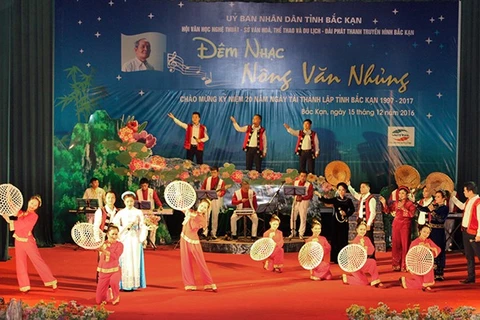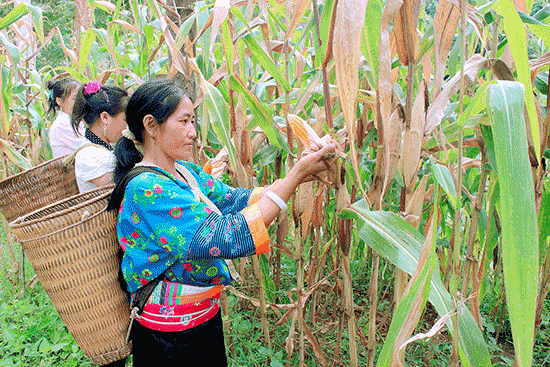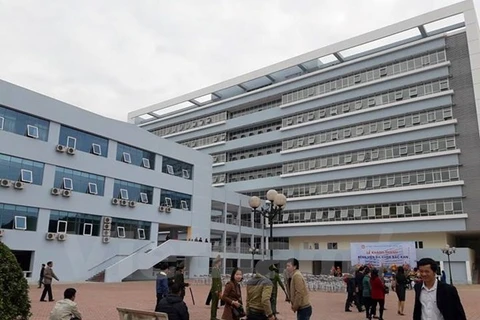Bac Kan (VNA) - The northern mountainous province of Bac Kan on December 29 received the Labour Order, First Class, on the 20th anniversary of its re-establishment.
Government leaders, including former Party General Secretary Nong Duc Manh, Deputy Prime Minister Vuong Dinh Hue, former deputy prime minister Pham Gia Khiem, as well as provincial leaders and a heroic Vietnamese mother took part in the event.
“Twenty years after its re-establisment, the province has gone from having many disadvantages to significant achievements in all fields. These achievements are highly appreciated and make us proud,” said Deputy Prime Minister Vuong Dinh Hue.
Nonetheless, he added, the province needs to make more effort to narrow the development gap with other provinces and tap its tourism potential.
"Over the past 20 years, Bac Kan province has made significant achievements in all fields, which contributed to the political stability and defence enhancement and served as a basis for the province to further develop. The achievements are highly meaningful to a province with many disadvantages like Bac Kan,” said former Chairman of the Bac Kan provincial People’s Committee, Hoang Ngoc Duong.
Being a province without a border gate, railway, harbour and airfield, having a total State budget collection of only 17 billion VND (750,000 USD) in 1997, Bac Kan has increased its budget collection to 500 billion VND (22 million USD) in 2015.
The province’s annual economic growth rate reached 6 percent in the 2010-2015 period. By 2015, the province’s GRDP hit more than 7.6 trillion VND (337.7 million USD) and is estimated to be 8.3 trillion VND (368.8 million USD), 23 times higher than 1997’s.
The annual income is 25 million VND (1,100 USD) per capita in 2015, compared to 1.25 million VND (55 USD) in 1997.
From a province without electricity in 1997, Bac Kan now has about 95 percent of households connected to the national grid. Roads have been upgraded and the Cho Moi-Thai Nguyen highway will also open soon.
The province receives an estimated 440,000 tourists, yielding revenues of 300 billion VND (13 million USD), a 78 times increase compared to the previous decade.
It also plans to co-operate with a tourism company to invest in the Saigon-Ba Be eco-tourism zone project, said Chairman of the Bac Kan People’s Committee, Ly Thai Hai at the conference.
The province also has two products with geographic indication certificates, seedless persimmons and tangerines.
According to Hai, the province targets a 6.6 percent economic growth rate in the 2016-2020 period and State budget collection of 1.1 trillion VND (48.9 million USD) by 2016.
It also aims to have malnutrition among children under five reduced to less than 18 percent; 98 percent of the population connected to the national grid and 98 percent of households with access to clean water.
In order to achieve these goals, the province will strengthen its administrative procedure reform, strengthen the commodity agriculture; push investment promotion activities, and mobilise resources to invest in infrastructure for socio economic development, said Hai.
The province will also encourage businesses to invest and develop supermarkets, shopping malls and entertainment centres; encourage companies to develop eco, cultural, historic and religious tours, said Hai.
Bac Kan, established on January 1, 1997, was once one of the most disadvantaged mountainous provinces in the country. The 5,000sq.km province has a population of more than 313,000 from seven ethnic groups (Tay, Nung, Kinh, Dao, Mong, Hoa, San Chay).-VNA
Government leaders, including former Party General Secretary Nong Duc Manh, Deputy Prime Minister Vuong Dinh Hue, former deputy prime minister Pham Gia Khiem, as well as provincial leaders and a heroic Vietnamese mother took part in the event.
“Twenty years after its re-establisment, the province has gone from having many disadvantages to significant achievements in all fields. These achievements are highly appreciated and make us proud,” said Deputy Prime Minister Vuong Dinh Hue.
Nonetheless, he added, the province needs to make more effort to narrow the development gap with other provinces and tap its tourism potential.
"Over the past 20 years, Bac Kan province has made significant achievements in all fields, which contributed to the political stability and defence enhancement and served as a basis for the province to further develop. The achievements are highly meaningful to a province with many disadvantages like Bac Kan,” said former Chairman of the Bac Kan provincial People’s Committee, Hoang Ngoc Duong.
Being a province without a border gate, railway, harbour and airfield, having a total State budget collection of only 17 billion VND (750,000 USD) in 1997, Bac Kan has increased its budget collection to 500 billion VND (22 million USD) in 2015.
The province’s annual economic growth rate reached 6 percent in the 2010-2015 period. By 2015, the province’s GRDP hit more than 7.6 trillion VND (337.7 million USD) and is estimated to be 8.3 trillion VND (368.8 million USD), 23 times higher than 1997’s.
The annual income is 25 million VND (1,100 USD) per capita in 2015, compared to 1.25 million VND (55 USD) in 1997.
From a province without electricity in 1997, Bac Kan now has about 95 percent of households connected to the national grid. Roads have been upgraded and the Cho Moi-Thai Nguyen highway will also open soon.
The province receives an estimated 440,000 tourists, yielding revenues of 300 billion VND (13 million USD), a 78 times increase compared to the previous decade.
It also plans to co-operate with a tourism company to invest in the Saigon-Ba Be eco-tourism zone project, said Chairman of the Bac Kan People’s Committee, Ly Thai Hai at the conference.
The province also has two products with geographic indication certificates, seedless persimmons and tangerines.
According to Hai, the province targets a 6.6 percent economic growth rate in the 2016-2020 period and State budget collection of 1.1 trillion VND (48.9 million USD) by 2016.
It also aims to have malnutrition among children under five reduced to less than 18 percent; 98 percent of the population connected to the national grid and 98 percent of households with access to clean water.
In order to achieve these goals, the province will strengthen its administrative procedure reform, strengthen the commodity agriculture; push investment promotion activities, and mobilise resources to invest in infrastructure for socio economic development, said Hai.
The province will also encourage businesses to invest and develop supermarkets, shopping malls and entertainment centres; encourage companies to develop eco, cultural, historic and religious tours, said Hai.
Bac Kan, established on January 1, 1997, was once one of the most disadvantaged mountainous provinces in the country. The 5,000sq.km province has a population of more than 313,000 from seven ethnic groups (Tay, Nung, Kinh, Dao, Mong, Hoa, San Chay).-VNA
VNA
























